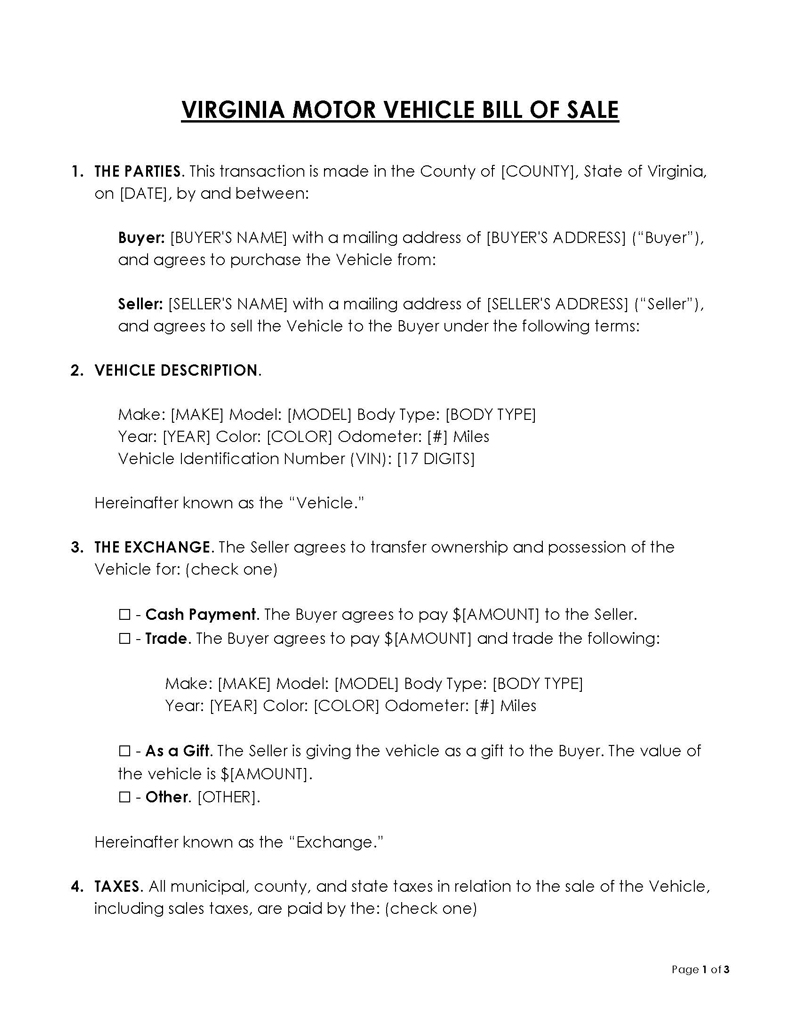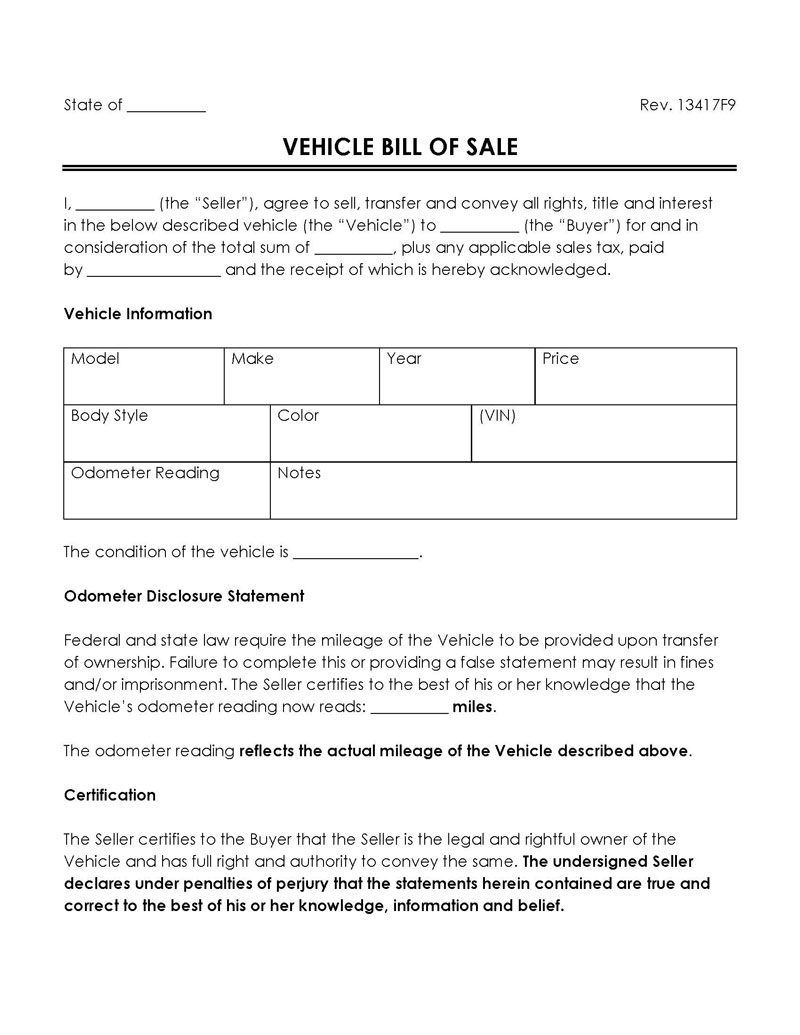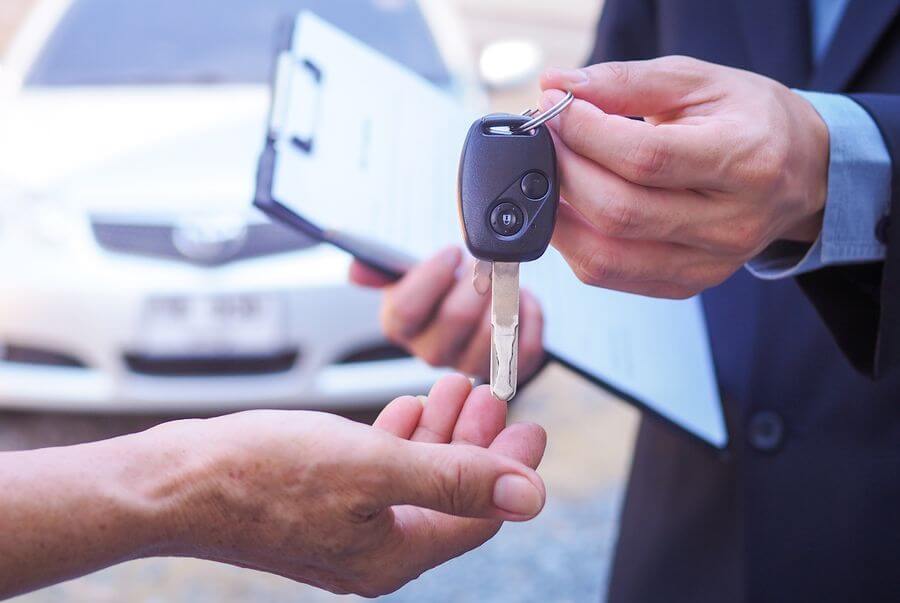When buying or selling a vehicle through a private sale in the state of Virginia, you will need a bill of sale for Virginia. It acts as both a receipt for the transaction and a legal document that can be used should there be any discrepancies with the vehicle. For example, if the seller had gotten a ticket a couple of days before they sold the vehicle, the buyer can prove that they were not the owner of the vehicle at that time. This is also needed when the buyer titles and registers it for the first time.
Other Requirements
Along with it, you will need Form VSA-5 (Odometer Disclosure Statement) if the title of the vehicle has been lost. Otherwise, the procedure for recording the odometer reading in the state of Virginia is to record the mileage on the title at the time of transferring ownership.
If you will be registering a vehicle for someone other than yourself, you will need to complete a Vehicle Power of Attorney (Form VSA-70).
Signing and Language Requirements
In the state of Virginia, this form must be signed by both the seller and the buyer. Notarization of the document is not a requirement. If the vehicle is older than 5 years, you will need to complete Form SUT-1 (Affidavit of Vehicle Purchase Price) at the time of purchase, and both parties must sign this form.
The Virginia DMV does offer some of its forms in Spanish, and a translator may be used to interpret them. However, this bill of sale only comes in English. If you are creating your own document in another language, it will need to be translated to English if you need to submit it to the DMV.
Number of copies
There should be two copies of it; one for the seller and one for the buyer.
Creating a Vehicle Bill of Sale for Virginia
The Virginia DMV does not have its own BOS. However, for vehicles that are five years old or younger, you will need to use Form SUT-1a. For vehicles that are older than five years, you can create your own document.
The document requires the following details:
- The date that the document was created
- Full legal name, address, and contact details of both the seller and the buyer
- Description of the vehicle that is being sold. This must include the make, model, year, body type, VIN, color, and odometer reading
- The amount that the vehicle was sold for
- Payment details – indicate whether full payment is received or partial payment with the expected payment date for the remainder of the amount owed. You may also use this section if the sale involves a trade-in vehicle.
- Method of Payment (cash, money order, check, etc)
- Include the tax amount that is part of the purchase if applicable
- Disclosure – this is where you would list any known issues or whether the sale is for the vehicle as-is, with the buyer being made aware of issues and agreeing to take care of them
- Signature of both the seller and the buyer
- Notarization – while notarization of this document is not a requirement, having it done adds more weight to the document should it be needed to protect against liability
Free Templates


After the Vehicle has been Purchased
There are other steps that need to be taken once the vehicle has been sold, depending on the situation. If the vehicle was purchased through a dealership, the dealer will usually take care of the paperwork for registration for the buyer. You should also be provided with a valid safety inspection sticker, which will be required when registering the vehicle.
For vehicles purchased as a private sale, the following will need to be done:
Seller
The seller is required to complete the section “Assignment of Title by Owner” that can be found on the vehicle title. An odometer reading or Form SUT-1a must be completed. If the vehicle being sold has a lien against it, the seller will need to complete Form SUT-4 (Transfer of Certificate of Title with Lien). Proof of the sale price is also required, which can be done using a bill of sale for Virginia, listing it on the vehicle’s title, or, for vehicles older than 5 years, completing a Vehicle Price Certification (Form SUT-1)
Buyer
The buyer is required to take out insurance before registering, or they may pay an uninsured motorist fee of $500. This will let the buyer register their vehicle and drive it for a year, however, it does not replace liability insurance. This means that the buyer is responsible for damaged and injury if there is an accident.
The buyer is also required to have a safety inspection done before they register the vehicle. Certain counties and cities in Virginia also require the buyer to have an emissions test done:
Counties:
- Stafford
- Fairfax
- Arlington
- Prince William
- Loudoun
Cities:
- Manassas Park
- Alexandria
- Falls Church
- Manassas
- Fairfax
If you need to move an unregistered vehicle so that you can have emissions testing and an inspection done, you may apply for a 3-day trip permit for $5.00.
Registering a Vehicle in Virginia
By law, all vehicles that are to be driven on public roads are required to be registered. Normally, titling and registration are done at the same time. While there is no set timeframe in which to register a vehicle in Virginia, it is advised that you do so as soon as possible. If you are new to the state of Virginia, you will have 30 days from the time of residency to register the vehicle.
You can register your vehicle for a period of 1 to 3 years. Registering a vehicle for the first time must be done in person at your nearest Department of Motor Vehicles office, a mobile office, or a recognized customer service center. You will need to make an appointment for the mobile office option. The customer service center allows you to drop off your documentation and pick your registration up 3 to 5 days later.
You also have the option to mail your document to your local DMV office. If you are using the US Postal Service, send documentation to Virginia DMV, Titling Department, P.O. Box 27412,
Richmond, VA 23269.
If you are using a delivery service, such as FedEx or UPS, send your documentation to Virginia DMV, Titling Department, 2300 West Broad St, Richmond, VA 23269.
Renewals can be done online on the Virginia DMV website.
Documentation Required for Registering Your Vehicle
- Completed this form, signed by both parties. For vehicles that are 5 years or newer, a completed Form SUT-1a. Vehicles that are older than 5 years will need Form SUT-1.
- Completed Vehicle Registration Application (Form VSA-14) if the vehicle has an existing Virginia title
- Manufacturer’s Certificate of Origin (for vehicles that are new in the state of Virginia)
- Odometer Disclosure Statement if the vehicle is older than 5 years (Form VSA-5)
- A completed Application for Certificate of Title and Registration (Form VSA-17a)
- Proof of Name and Address – you can use a valid and current Virginia driver’s license or similar state ID
- For registrations that are being done by a third party, a completed Form VSA-70 (Power of Attorney) will be required
- Vehicle Inspection and Emissions Testing for the counties and cities mentioned above
- Proof of vehicle liability insurance, which must have the following minimum requirements:
- Cover of $25,000 for death or injury of one individual per incident
- Cover of $50,000 for two individuals or more per incident
- Cover of $20,000 for damage to property per incident
- Funds to cover required fees
Registration Fees
The amount that you will pay for your registration fee will depend on the vehicle’s gross weight, and the time frame for which you will renew (1 to 3 years). There is also a use tax and sales tax, which is calculated as 4.15% of the sale price of the vehicle.
Once you have completed the registration process, you will be given your license plates and your registration card. You will also be given registration stickers that show the registration expiry date. These must be affixed to your license plates.








